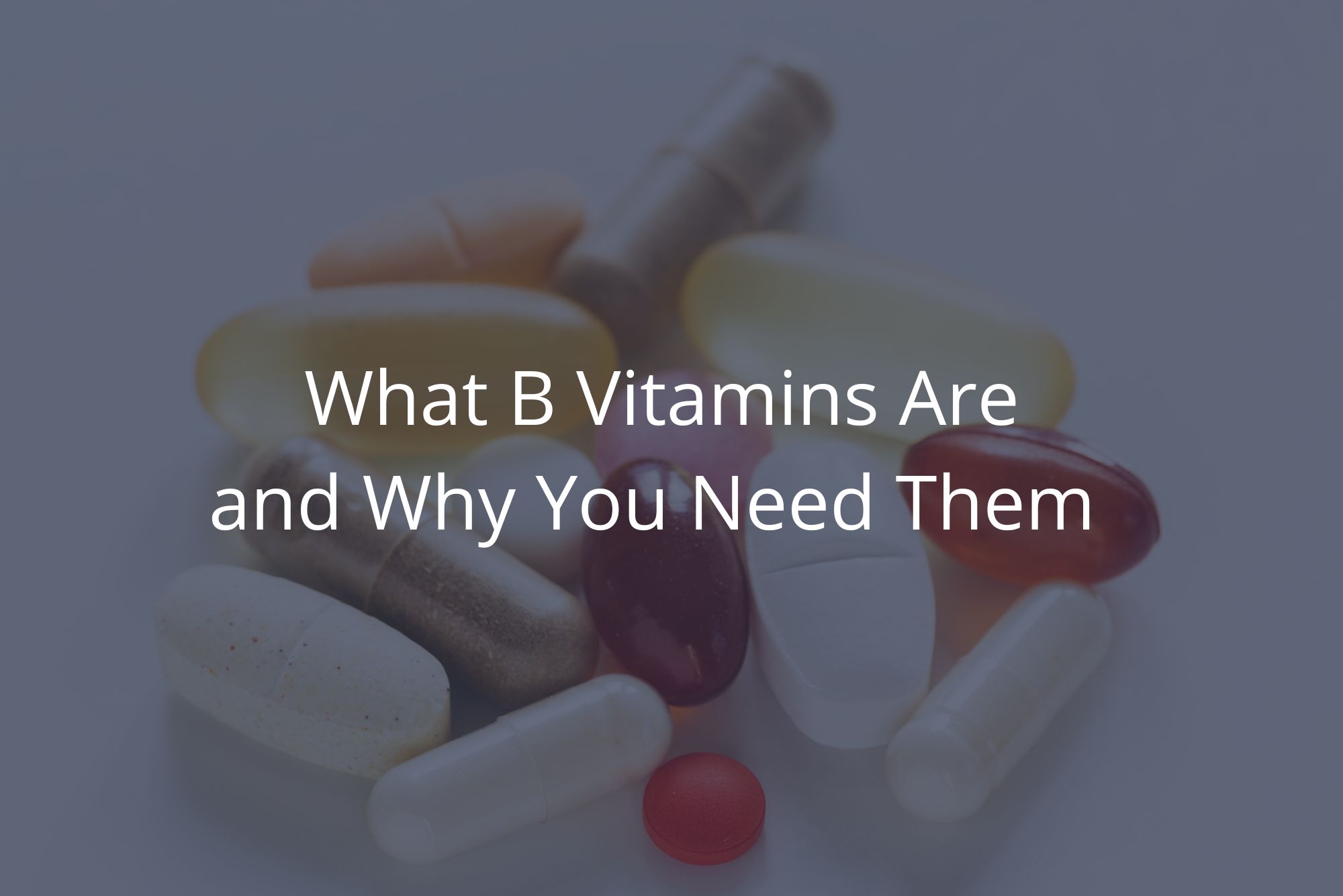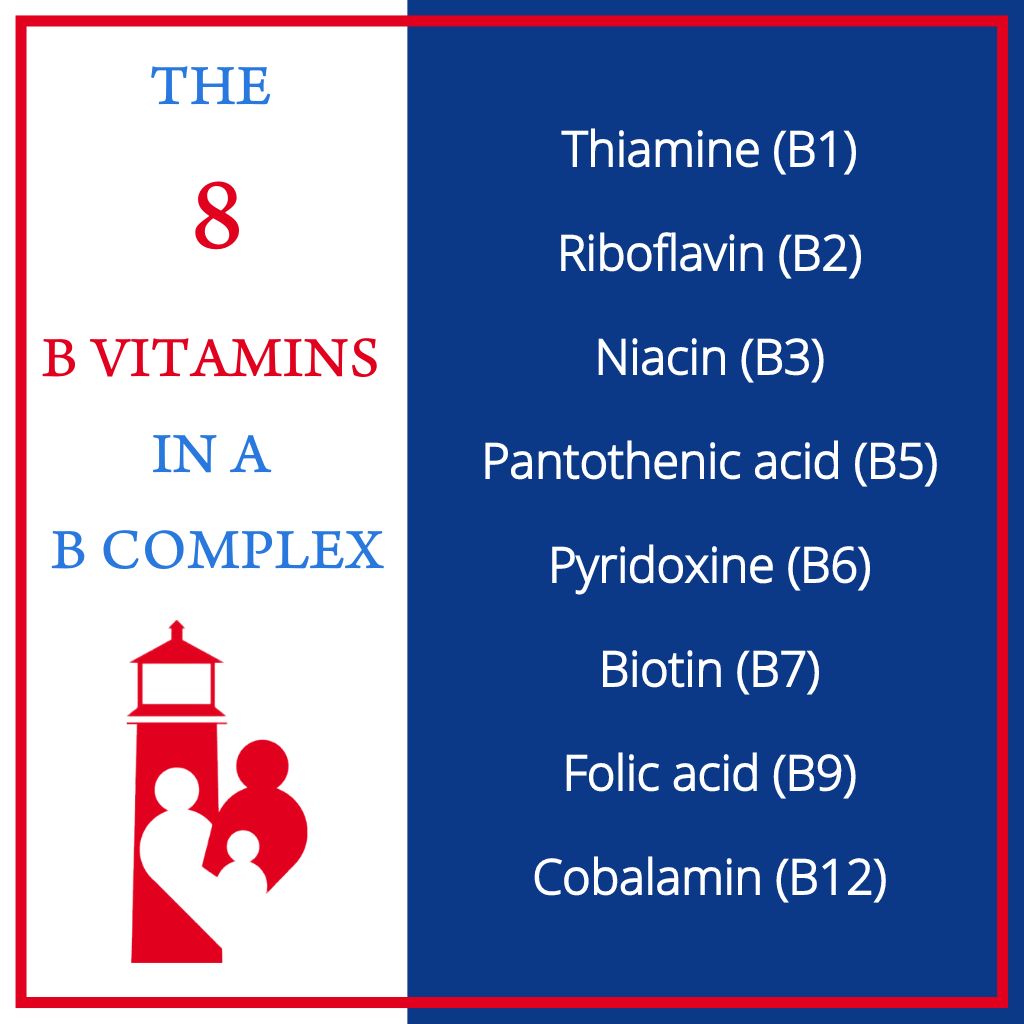
Most of us know, having been taught from a young age, that vitamins and minerals are crucial components of healthy living. But other than dutifully swallowing a multi-vitamin, how much do we really know about each of these essential nutrients?
It’s a vast topic, and today I want to explore a sliver of it: B vitamins.
Most of us have heard of B vitamins, especially some of the more well-known ones like B12 and folate. But what are the B vitamins, and what is the difference between B complex and B12, or riboflavin and biotin?
And, most importantly, why should we care about B vitamins one way or the other? In this post, we’ll discuss it all. Read on.
What Are B Vitamins For?
B vitamins act as cofactors in our bodies, meaning they help chemical reactions occur. Without B vitamins, enzymes don’t work. You could have the very best balance and intake of macronutrients — proteins, carbohydrates, and fats — but without B vitamins, all reactions come to a standstill. That beautifully balanced diet falls flat.
Vitamins, then, are comparable to spark plugs; they ignite your metabolic reactions.
What Is the Difference Between B Complex and B12?
People often ask about the difference between B-complex and B12 vitamins. A B-complex vitamin actually includes eight different B vitamins, which is why it’s called a complex. B12 is simply one of these eight.
B12, also known as cobalamin, is one of the most well-known (and sought after) B vitamins. It rose to fame primarily because of its vital role in the structuring of hemoglobin, the carrier of oxygen in our blood. B12 also plays roles in lots of other crucial functions, including metabolism, nerve function, and DNA production.
Because food sources of B12 primarily include poultry, meat, fish, and dairy, vegans and vegetarians need to be mindful of getting enough of this critical vitamin. A deficiency of B12 can lead to anemia, fatigue, weakness, and even nerve damage.
What Are the B Vitamins in a B Complex?

The B vitamins in a B complex are water soluble and perform essential — and closely related — roles in the body’s cellular functioning. B12, with its effect on hemoglobin and nerve function, is clearly important. Other B vitamins also play vital roles at different parts of the body’s energy cycles.
So while a single B vitamin will be responsible for one part of a reaction in your body, you need all the rest for the other parts of the reaction.
A B complex provides the essential B vitamins your body needs to carry out its reactions properly. These are the eight B vitamins you’ll find in a B complex:
- Thiamine (B1) — Breaks down carbohydrates and supports memory and cardiac health. Some sources say it helps reduce insect bites, though a recent study disagrees.
- Riboflavin (B2) — Helps the body metabolize other nutrients and supports cell growth and development.
- Niacin (B3) — Protects brain cells, supports healthy cholesterol levels, and aids in cellular energy production.
- Pantothenic acid (B5) — Aids in the manufacture of red blood cells and adrenal hormones.
- Pyridoxine (B6) — Supports healthy brain development, liver function, and immune system maintenance.
- Biotin (B7) — Crucial nutrient during pregnancy and contributes to skin, hair, and eye health in adults.
- Folic acid (B9) — Also important during pregnancy to reduce the likelihood of certain birth defects, and vital for your body’s ability to produce new cells.
- Cobalamin (B12) — Helps with red blood cell production, iron use, and energy levels.
Can You Have Too Much of a Good Thing?
One of the most common questions people ask about taking B vitamins is, what happens if I take too much?
The good news is that B vitamins are water soluble. Instead of storing any excess, your body eliminates what it can’t use through your urine.
When Are B-Vitamin Supplements Helpful?
If you eat a diverse, colorful, vegetable-rich diet, you likely get most of the B vitamins you need. However, if you need more B vitamins than your diet provides, B-complex vitamin supplements are an inexpensive way to access them.
For general health, an inexpensive B-complex vitamin supplement will give you plenty of the B vitamins you need. If you have a specific medical issue, however, then your physician might prescribe higher amounts of an individual B vitamin to address the issue.

Dr. David Rosenberg
Dr. Rosenberg is a board-certified Family Physician. He received his medical degree from the University of Miami in 1988 and completed his residency in Family Medicine at The Washington Hospital in Washington, Pennsylvania in 1991. After practicing Emergency Medicine at Palm Beach Gardens Medical Center for two years, he started private practice in Jupiter, in 1993. He is an avid baseball fan and Beatles fanatic, since he was 8 years old. He has been married to his wife, Mary, since 1985 and has three grown children.
David completed additional studies at Mercer University, Macon, Georgia and obtained a BS in Chemistry in 1983.
“My interests include tennis, snow skiing, Pilates and self-development.”
